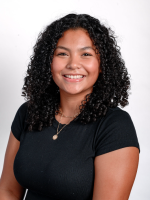Headlines out of Hialeah these days suggest the second-largest city in Miami-Dade County is under strain from a new influx of Cuban migrants.
It’s reminiscent of a time more than 40 years ago when Hialeah experienced another sudden surge of Cuban migrants — who were then known as los Marielitos because they were among the 125,000 Cubans who arrived in South Florida over a six-month period in 1980 from the Cuban port of Mariel.
One of those Marielitos was 8-year-old Edel Rodriguez. He grew up to be a nationally recognized artist and graphic designer, known especially for his cover illustrations for Time Magazine.
READ MORE: A new graphic memoir details illustrator Edel Rodriguez's escape from Cuba in 1980
On the South Florida Roundup, WLRN’s Tim Padgett spoke to Rodriguez about his graphic memoir titled, Worm: A Cuban-American Odyssey. It's the story of his family’s dramatic Mariel escape from Cuba, their struggles in Hialeah — and eventually, his triumph in New York.
The book’s title, worm or Gusano in Spanish, was the word Cuban dictator Fidel Castro used to label at Cubans like Rodriguez’s family who sought to leave the communist island.
“One of the first decisions I made was the title and I went from there. I didn't really want to change it once I headed in that direction,” he said. “That and the cover itself."
The cover depicts a young Edel in a communist young pioneer outfit. He says that even though he was doing everything he was supposed to do, the revolution still called him and his family worms because his parents wanted a better future for him.
“Any time that someone hurls an insult or comes at me in some way. I use that in my work. [I don’t] welcome it, but I'm not afraid of insults. I try to make something out of basically nothing,” he said.
Rodriguez and his family lived in the rural town of El Gabriel. He says that he had a pretty regular family and that they were almost middle-class, considering where they were. He says they had a good life before leaving the country — but that something just didn’t feel right.
“From the time [you’re] four or five, [the Cuban government] starts indoctrinating children to become part of the revolution. By the time they're 16 or 17, they're in the army. It's a system that my parents felt very uncomfortable [with],” said Rodriguez.
“They didn't like the way the government was pulling the children out of the home and bringing them to these country schools. Basically driving a wedge between the parent and the child.”
This led Rodriguez’s parents to decide to jump at the chance to escape Cuba in the Mariel boatlift.
But it wasn’t as easy as just hopping on a boat. In this memoir, he shows the audience what a really long and harrowing process getting to Florida was — including sharing a boat with criminals Castro spitefully released from prison to be part of the exodus.
His family was put in the El Mosquito detention camp. He talks about seeing people being pulled out and beaten at their workplace, having very little food and being around prisoners and people from insane asylums.
“There's this perception here where you just left your house, you got in a boat [and] you're in Miami the next day. [But it] was a very long process of like drawn out punishment from the Cuban government … They wouldn't let the families just leave with the family members that came to get them. You had to take prisoners, prostitutes and all sorts of things back on the boat,” he said.
After his family arrived in South Florida in the boatlift, they settled in the Cuban enclave of Hialeah. At one point in his book he says, “For me, America was Hialeah … A place we call El Exilio, exile. The name made it feel temporary, a placeholder. It was somewhere to be until the day it was safe to go back home to our friends and family in Cuba.”
He says that as a kid, he really believed he would go back to Cuba and be with his grandparents again. But, the years passed and at some point, he realized that living in the US was a permanent thing for his family. This led him to find his career path.
“Once I realized that was going to stay here, I wanted to make something of myself to prove to my parents that their sacrifice was worth something. And that's when I decided, okay, I want to be an artist. All my teachers said, if you really want to be an artist [you have to go] to New York City … [so] I went off on a new adventure,” he said.
You can listen to the full conversation above or wherever you get your podcasts by searching: The South Florida Roundup.






